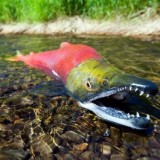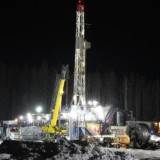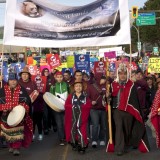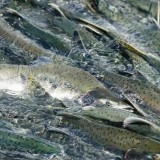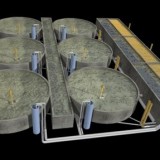The Salmon Recipes: Stories of Our Endangered North Coast Cuisine is not only visually exciting but it exudes an intense and compelling power that is conveyed in an instant, before one word is read. A quick glance through the book reveals brilliant images of salmon steaks, boiled crabs and steamy chowders interspersed with breaching whales, solemn totems, spirit bears and fishing boats. The cascade of vivid colours tumbling from page to page are symbolic of the living vitality that blesses this bountiful coast with an endless feast of seafood, an awesome variety of wildlife and dramatic scenery becoming an Eden on Earth.
The 120-page book is gloriously colourful, the oranges and siennas of salmon flesh and sunsets juxtaposing with the silvers and blues of salmon sides and sea. Many of the pages look delicious enough to eat. Published by the Prince Rupert Environmental Society, The Salmon Recipes is a rare combination of assertion and celebration, of resistance and affirmation.
The entire book is so masterfully designed it feels like a work of art. The first page is a stately and solid green, suggestive of deep oceans and bounty — except for a small salmon image in the upper corner, floating as if on cedar. This is followed by a double-page image of a spawning salmon, perhaps the most hauntingly beautiful ever published in a book. The pinks and purples of the dying fish are ghostly and magical, the eternal cycle of life and death revealed in one arresting image. The open mouth of the fish drinks in the inviting current of river where it will perish and regenerate. Beneath its crooked and gasping jaw is a hard patch of gravel — warmed and softened by a beam of sunlight, it patiently beckoning with release and peace. The constant gaze of the fish’s large eye glows with the same unwavering urge that has lured it seaward and now compels it to return to its impending death. This is the unblinking and unfailing spirit that energizes the living North Coast and must also be the fire that inspires the makers of this book.
[signoff3]
Indeed, something primal powers this book because it instantly conveys a sincerity, a weight, a presence and an authority that can only arise from deep conviction, brave honesty, and the direct experience of living and flourishing within this timeless coastal Eden.
This captivating seafood cookbook gets its power from juxtaposing its vivid recipes with stories, observations, aphorisms and testimonials from the people who live along the North Coast, the very place where massive foreign oil tankers may come to collect Alberta bitumen pumped to Kitimat by Enbridge’s Northern Gateway pipeline. The thought that the sticky curse of black crude could darken all this life and colour with its toxic stench reveals the outrageous folly of even considering such a proposal. As the book attests, this is a sacred place, a holy garden that still remembers the very beginning of Creation.
This, of course, is the purpose of the book. The Salmon Recipes is not so much an argument in opposition to oil tankers as a statement of defiance, a vivid illustration of the incalculable loss that would result from an inevitable oil spill. If the book were merely about cooking, it would be sensational. But it’s also a testimonial from the heart, an assertion that the very soul of the North Coast is an ancient and inseparable bond so intense it unites the people and their environment into one indivisible whole. Thus, they can legitimately say, “Our land tastes like salmon.”
The first official words of the book are a prayer by Rev. Ha’eis Clare Hill from the Hartley Bay Gitga’at Nation. “Holy and Mighty God, all the earth is your creation. Before us lies the great and wide open sea with its living things too many to number, creatures and plants both great and small. We all look to you to give food in due season. You give it; we gather it. You open your hand and we are fed. For that we are truly thankful. Send forth your spirit upon us today so we may feel renewed and refreshed as we continue in this process of sharing our stories.”
This book, then, is as much a sharing of stories as it is a sharing of recipes. If the people who drill for oil, build pipelines and operate tankers could experience the North Coast as deeply and profoundly as the people who live there, perhaps they would understand the folly of subjecting it to risk. In one anecdote, a young Gitga’at man takes his twin sister on her first visit to the spirit bears. She weeps at the experience. “Now you see,” he says to her, “the beauty in what we see.” In another anecdote, a Gitga’at man tries to understand how two days of hearings at Hartley Bay can be informative to the Joint Commission that is weighing the wisdom of pipelines and tankers for the North Coast. “Never, ever in my life,” he says, “did I think I’d be standing and explaining who I was in my own home. I listen and I look and that’s how I learn.” If the operators of pipelines and tankers want to understand the trespass they are plotting, he suggests they should “come fish with me; then you’ll really learn who I am.” Better still, they should take the advice of his elders. “Come back. You come back,” they say.
Herein lies the power of The Salmon Recipes. This book is an invitation into the lives of the people whose existence is inseparable from health and vitality of the North Coast. Read their words. Try their recipes. See the images of their food. Remember the animals. Imagine the place they love and cherish until it “tastes like salmon”. Weigh their warnings of horrendous weather events. Their “drift bottle project” revealed that an oil spill in Grenville Channel would travel 94 kilometres in as little as 10 days. But this was just a study, just another piece of the damning evidence that should stop a mad and venal scheme from becoming anything more than a passing nightmare.
